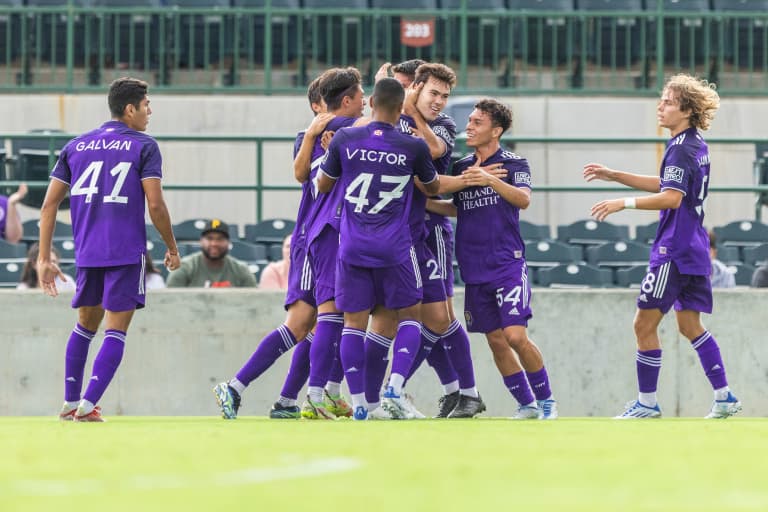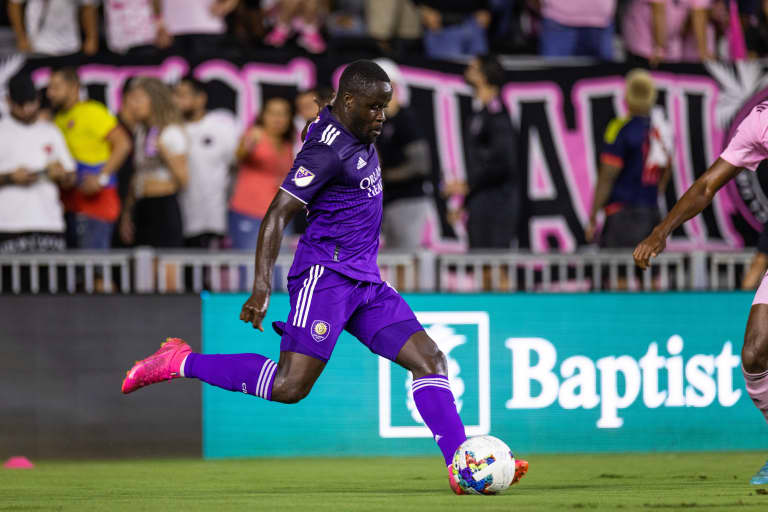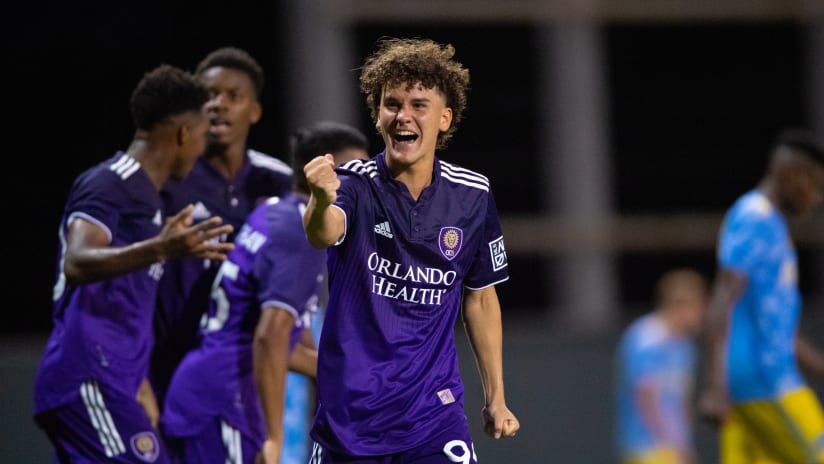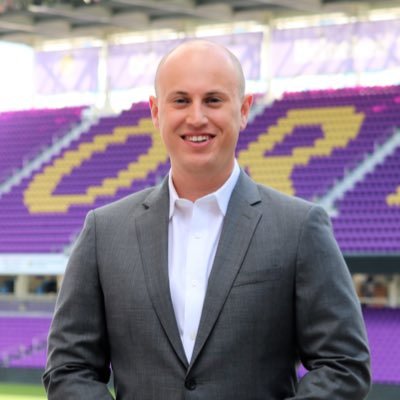Most 17-year-olds are doing what you’d expect at that age – sports, video games, rebelling against their parents, the usual.
In the world of professional soccer, though, if you’re good enough, you’re old enough. And sometimes, that means a 17-year-old can become a professional athlete. Just ask Orlando City’s Favian Loyola.
“[I’m] definitely really blessed to have this moment with my family,” Loyola said moments after putting pen to paper on his first professional contract, a deal which inked him to Orlando City B in MLS NEXT Pro, the league’s brand-new bridge from the academy level to the top flight.
“It's an incredible moment because I started here. My first Academy was Orlando City and to be here, where I am right now, is truly amazing.”
Loyola, an offensive dynamo who can play as an attacking midfielder, an inverted right winger, or even as a false nine, just finished a whirlwind year in which he got called into a United States U-19 national team camp, debuted as a professional just weeks after his 17th birthday, and was named MVP of the first-ever MLS NEXT All-Star Game, a meeting of 45 of the top academy talents in the U.S. back in August.
“My thought was to have fun, play with joy, and always think positive,” said Loyola of his All-Star experience. “At the end of the day, I did all those three [things] and was blessed to get the MVP. It was honestly breathtaking. I got out [of] the game and it's like, ‘Oh, Favian Loyola, you’re MVP.’ Wow.”
Loyola’s rise was a rapid one – he was a 16-year-old Academy player at the start of the year who began the season playing at the U-17 level and just made his pro debut in mid-June. But if Orlando City has its way, stories like Loyola’s will soon be the norm.
Establishing the Foundation
When Orlando City Academy Director Marcelo Neveleff joined the Club in late May 2019, he immediately recognized the first need for the program.
“My first message to [Executive Vice President of Soccer Operations] Luiz Muzzi and the coaching staff back then was, ‘Listen, let’s establish a name,’” Neveleff said of his arrival. “The first thing we're gonna do is lead by example, we're going to give an opportunity to our local kids. And then once we establish our name, then we're going to start getting more talented players, talented kids.”
Neveleff’s hiring coincided with the Club announcing it would invest in a state-of-the-art training facility in Kissimmee. Now dubbed the Orlando Health Training Ground at Osceola Heritage Park, the campus opened to rave reviews in January 2020 and put the First Team under the same roof as the Academy for the very first time in Club history.
It would be some time before Neveleff’s charges ever got to use it. Just weeks after the facility opened, the COVID-19 pandemic shut down life around the country, closing the Academy for several months. Neveleff and his coaches had to make up for lost time when they got back.
“I believe that we are very capable, this coaching staff,” said Neveleff. “Everybody understands their role. We are a group of people that don't complain about working extra hours, extra days if we need to. I think that the secret is that I found people as passionate as I am to develop this program.”
Loyola, just 15 when he returned to Academy training after pandemic restrictions were eased, was one of the first players to benefit from the new set-up.
“Being in [that environment], you’ve got no choice. You're around all eyes,” said Loyola. “The staff is amazing, to this point where it's like, you have the First Team right next to us training. You never know if [First Team Head] Coach [Pareja] comes down to watch, so you always have to be ready and have that mindset that you could be going up anytime.”
Heading into 2021, the Academy staff felt like they were finally starting to get on firm ground. Now, it was time to show proof of concept.

National Champions
Among the biggest fans of the move to the Orlando Health Training Ground was Javier Carrillo, Orlando City’s U-17 Head Coach.
“The biggest competitive advantage that we have is that we have everybody in the same place,” Carrillo said. “So now when it comes to player movement and exposing them to new challenges, it’s one field over. Once you provide that opportunity, you start digging into the players’ mentality. They start seeing that, ‘Okay, going pro, it's actually something that I can accomplish.’”
Over three years with Orlando City, Carrillo has developed a reputation as one of the Academy’s brightest coaching prospects, a demanding yet rewarding teacher who finds a way to win.
“He's very effective because he cares about the kids, the players, as human beings,” said Neveleff, who coached Carrillo back in his playing days. “And he also understands the demands of the game today. He tries to be ahead of the game. In education, in scouting, watching not only the Orlando City First Team, but teams around the world. He wants to get better, but he also knows that for him to get better, he needs to make others better.”
Carrillo just recently received his Elite Formation Coaching License from the French Football Federation, a major step in his career and a valuable educational tool for his players. Due to the pandemic, the normally year-long process took him three to complete.
“These past three years, I've been exposed to a level of expertise that I hadn't been exposed to,” said Carrillo. “And not only do they develop you on the field, but off the field, when it comes to how you carry yourself and how you lead a team. I think it's a very complete course where you get to meet the top prospects coaching-wise from all the MLS clubs. I really hope that they continue to roll it out and then for our next Academy coaches to have the opportunity.”
Clearly, the continuing education is working – Loyola, who was a part of Carrillo’s 2021 U-17 side, credits Carrillo for flipping a switch in his development.
“Coach Javi really got my game to the next level,” said Loyola. “I came here to Orlando not really playing with confidence, and he kind of brought me to a level I was supposed to play at. He's worked on me several times after training, worked on my left foot and worked on several things I've always needed help with and he's always just been there as a coach.”
“First of all, I think the credit is his, not mine,” said Carrillo of his young attacker. “We're here to push the players, we're here to expose them to levels that they haven't seen. And our job is for them to reach their highest potential. And I think Favian has taken the right steps to improve in aspects of the game he had to develop.”
Loyola and the U-17s, representing the top level of the Academy, enjoyed a strong 2021 season, qualifying for the inaugural MLS NEXT Cup, the final event of the newly-branded MLS NEXT season that would see each age group crown a national champion. Despite all the upheaval within the Orlando City Academy, Carrillo knew his team had the bona fides to go all the way.
“These are kids that were young adults, that were young professionals,” Carrillo said. “They knew what it took to suffer in games, they knew how to play well when they needed to. They adjusted to situations well. And I will say the biggest competitive advantage for us, when you see all the clubs, I will say it was the competitive mindset that we had. We knew that we were going to compete no matter what.
“Games can go either way. But one thing for Orlando City players, you need to get on the field, you need to compete.”
The young Lions competed in every game they played. Their run included wins over two other MLS academies in New England Revolution and LA Galaxy and two penalty-kick shootout victories, including a heart-stopper in the final against New Jersey’s Players Development Academy, one of the top youth set-ups in the United States. At the end of it all, Orlando City claimed the very first U-17 MLS NEXT national championship.
“We knew what we wanted,” recalled Loyola. “Every game we came with energy. Coach Javi was always on us, always wanting to have a high standard.”
The new regime had what it needed – a trophy to back up its message.
Carrillo put it pretty simply: “And these players, they know now coming to Orlando City, [they] need to be ready to compete because that's what this place demands.”
Completing the Pathway
Complacency was not an option heading into 2022.
The Academy continued to notch results, with Carrillo’s U-17s reaching the semifinals of the 2022 MLS NEXT Cup before falling just short of defending their title. Seventeen-year-old right back Alex Freeman from the national championship team signed an MLS Homegrown deal, following in the footsteps of fellow teenager Thomas Williams the year prior.
But after three years and a pandemic, the time had come to create a true comprehensive pathway from the developmental years all the way up to the First Team. Two steps along that pathway were missing – a side younger than the U-15s to get kids into the program at a more impressionable age, and a true second team to give professional minutes to the top Academy players.
2022 saw Orlando City fill both gaps.
City was helped substantially by MLS on the latter goal. MLS NEXT Pro, an all-new second division featuring 20 MLS reserve teams along with independent club Rochester New York FC, launched in late March with Orlando City B as a founding member.
“It’s amazing,” said Loyola of the new league, where he scored six goals in just 669 minutes this season. “[Before this year] they didn't really have that pathway for players and [they] weren't really using those young players. There was an OCB prior but it wasn't really a [youth] environment like MLS NEXT Pro. I've learned about the intensity of the game, the speed of play, stuff that you wouldn’t get [exposed to] within the Academy. It brings me to realize that you need to change a couple of details to really get to a high level.”
Led by Argentine coach Martín Perelman, Orlando City B featured one of the youngest rosters in MLS NEXT Pro, opting to use the league as a launching pad for its Academy players to get exposed to professional soccer for the first time. The team played open and exciting soccer, often finding itself in some of the wildest games of the year, experiences the staff cherishes for its young charges.
“Some of the games [in MLS NEXT Pro] are very, very challenging for [our players],” said Neveleff, “Because some of the teams field players that have already played for their first team, or international players that the other teams bring to see if they can make their first team. [The league] is a great tool. We want to accelerate their development.”
“Sometimes we demand players to perform certain tasks, but the environment itself is not really requiring them to do it,” added Carrillo, whose national championship team made up a significant chunk of the OCB roster. “So the moment you expose them to a new challenge, it's not the coach anymore. It’s the game itself demanding for you to play quicker, for you to think quicker. So I think having that platform and that opportunity just allows our players to see something new that will help them get closer to the First Team.”
With a new back end of the pathway in place, it was time to build out the front. This summer, Orlando City officially added a U-12 age group to its Academy, promoting U-15 Assistant Coach Marcelo Antonelli to U-12 Head Coach.
“If you think about modern development, overall, [12 is] a great age for learning,” said Antonelli when explaining why the Club added the new age group. “So we have a player for example, let’s say he’s a U-17, you can work on certain things, and they're still going to improve something, [in the] same way you can improve as a professional. But at 12, you learn so much more. Your brain, your body can adapt so much better.
“An example is language, right?,” said Antonelli, who was born and raised in Brazil. “I learned English when I was over 20 years old, so we're never gonna get this accent out of me. But a boy at age 10 or 11, they can really pick up other languages and even not have an accent anymore. It’s the same for motor skills, you think about technical skills in soccer, but also for decision making, for the speed of play. Those characteristics, those capacities also develop so well at young ages.”
With kids in the program at what Antonelli calls “the golden age of learning,” Orlando City can now mold players into its vision and teach them the bedrock philosophy of the Club at an age where it will become a foundational piece of their development. Antonelli’s extensive background in futsal, a five-a-side version of soccer played on an indoor court, informs the U-12 program and helps teach the players how to operate in tight spaces.
“There’s so much about individual and small group tactics that futsal is so good [at teaching], and you can basically apply everything to the soccer field,” said Antonelli, who was a futsal goalkeeper in his playing days in the early 2000s and has written extensively on transferring futsal tactics into soccer. “More important for us at this age than having the exact same model of play from the First Team in the U-12s is developing players that are technically sound, that are able to make decisions, and that have leadership skills.”
Beyond the actual work of learning the game the Orlando City way, the kids get to practice at the Orlando Health Training Ground, right next to the older Academy players, Orlando City B, and even the First Team.
“When we're training in the afternoon, sometimes the First Team is training there and for the players just to see them there, they’re moving their heads, ‘Oh, it’s the First Team there! Is that Pato there? Is that [Robin] Jansson there?’ And they get so excited,” Antonelli recalls with a smile. “So being in this environment for sure makes a big difference. That's a big advantage that the kids have compared to being in other clubs. It's not just about the training schedule, not just about the methodology, but indeed, the environment. Being a professional club makes a big difference.”
Going forward, the Club plans to advance the current group of U-12s up the ladder to U-13 and U-14 ages, filling out a complete ladder from the youngest age group all the way to MLS. Loyola, who came in when the U-15 level was the Academy’s youngest age group, believes the new teams will help in a huge way.
“I’ve seen those kids training in the morning coming with cleats I have and shoes I have, I'm like, ‘Oh my god, the [U-12s] have everything I have,’” he said. “It brings joy to my face because it's like these little kids are experiencing what no other kid [here] experienced in soccer. Everyone wants to be them. Everyone wants to experience what they're experiencing.”

A Bright Future
With the pathway complete, the work continues. And the future looks very bright indeed.
Even the U-12s will have a feeder program. The Orlando City Youth Soccer Network, the Club’s community youth program that features soccer school affiliates all over Central Florida, transitioned 14 athletes and a coach into the Academy in 2022, with plans to continue that hunt for talent going forward. Over the 2022-23 academic year, select players from each of OCYSN’s schools will head to the Orlando Health Training Ground to train under Academy staffers, while OCYSN coaches will participate in a Coaching Observation Day with first team, second team, and Academy coaches.
The OCYSN has already had a major impact on the Academy. Orlando City U-15 Head Coach Phil Gordon has worked within the system since 2016 and earned a promotion from Senior Boys Soccer Director at OCYS to the U-15 job last summer. Gordon is also working on his Academy Director license to further his education and coaching ability.
Meanwhile, Orlando City B will play its second season in the newly expanded MLS NEXT Pro, which will see seven more MLS reserve teams join and bolster the total number of clubs to 28. Plans are in place for more expansion in the coming years. The eventual goal, one that appears closer and closer each year, is to see Homegrown players not only on the First Team roster, but playing significant minutes for Pareja’s side.
Homegrown forward Benji Michel, who came to the First Team in 2019, has already provided a taste of what those returns could look like, scoring and assisting goals in a game-changing substitute appearance in the 2022 Lamar Hunt U.S. Open Cup Final, which saw Orlando City lift its first major trophy in the Club’s MLS era.
“There's always something to work on,” said Loyola, who hopes to join Michel as a regular contributor to the First Team in the near future. “There's always a little space, even if you're perfecting that shot, I mean, there's still a little space to perfect it even more.”
“We want to grab our players’ hands, and take them through [this journey],” said Neveleff. “At the same time, if I take a player and walk them through it, at some point they’re going to have to walk and run on their own. By 2025 or 2026, the idea is that 50-60% of the First Team of Orlando City is composed of Academy players.”
An ambitious goal? Definitely. But the Orlando City Academy didn’t get this far in three years — bringing home a national championship and building out a full pathway under one roof all while battling a global pandemic — without some serious ambition.








